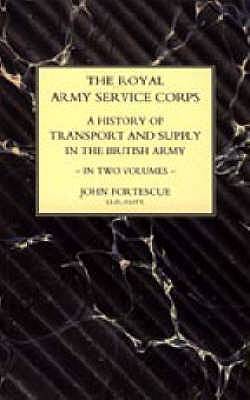
- Retrait gratuit dans votre magasin Club
- 7.000.000 titres dans notre catalogue
- Payer en toute sécurité
- Toujours un magasin près de chez vous
- Retrait gratuit dans votre magasin Club
- 7.000.0000 titres dans notre catalogue
- Payer en toute sécurité
- Toujours un magasin près de chez vous
Royal Army Service Corps. a History of Transport and Supply in the British Army
A History of Transport and Supply in the British Army
John Fortescue, Col R H Beadon
Livre broché | Anglais
53,45 €
+ 106 points
Description
These two volumes comprise the first comprehensive history of the RASC, taking the story of that Corps from its earliest beginnings as the Royal Waggoners at the end of the 18th century to the end of the Great War. It is a history that is very rarely come across and this is the first time I have seen it or heard of it. The first volume is by the well known historian and author of the monumental History of the British Army, Sir John Fortescue, and he traces the course of Transport and Supply through the innumerable campaigns involving the British Army which he has described in his history of the British Army. Following a couple of introductory chapters providing a brief survey of the history of transport and supply from the earliest times, his story proper begins with the wars of the French Revolution and Empire from 1793 to 1815. It was in this period that the new Corps was formed and he describes its part in those wars, and in subsequent chapters he covers the period from Waterloo to the Crimea and the various small wars - Ashanti, China, Kaffir, Sikh, and then the Crimean War when it became the Land Transport Corps and the Military Train. The Army Service Corps was authorised under that title in November 1869 and the rest of the book is the record of the Corps up to the end of the S African War. There is a very useful appendix which provides a tabulated history of the Corps and its predecessors from 1794 to 1894, highlighting all the significant dates and events.The second volume is essentially concerned with the Great War with a lengthy introduction by John Fortescue followed by a detailed survey of the Corps' progress during the period from the end of the war in S Africa to the eve of the Great War. Then comes the detailed study of the activities of the Corps in that war and in every theatre of that war, including operations on the NW Frontier. This is a fine history and it is a salutary reminder that the history of the Corps is very much the history of the British Army.
Spécifications
Parties prenantes
- Auteur(s) :
- Editeur:
Contenu
- Nombre de pages :
- 942
- Langue:
- Anglais
Caractéristiques
- EAN:
- 9781843427612
- Date de parution :
- 26-10-16
- Format:
- Livre broché
- Format numérique:
- Trade paperback (VS)
- Dimensions :
- 136 mm x 219 mm
- Poids :
- 1166 g

Les avis
Nous publions uniquement les avis qui respectent les conditions requises. Consultez nos conditions pour les avis.






